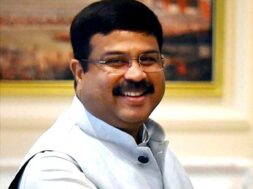
NEW DELHI, Aug 23: Under the transformative curriculum, the traditional annual board examinations will witness significant changes with the board examinations to be conducted twice a year with the students given the option to retain the best score, while class 11 and 12 students will have to study two languages instead of one, according to the Ministry of Education’s new curriculum framework under the New Education Policy, 2020.
The strategic move to hold examinations twice a year was aimed at curbing the high-pressure environment often associated with single annual exams. The Union Education Minister, Dharmendra Pradhan while announcing this on Wednesday said the new curriculum framework (NCF), in accordance with National Education Policy 2020, was ready and textbooks for the academic year 2024 would be developed.
“In classes 11 and 12, students will have to study two languages and one of them has to be an Indian language,” the final NCF (National Curriculum Framework) document said. This approach not only emphasises linguistic diversity but also celebrates the rich cultural tapestry of the nation. “In classes 11 and 12, students will have to study two languages and one of them has to be an Indian language,” the final NCF (National Curriculum Framework) document said.
In order to make the board exams “easier” from the current “high stakes” practice, the examination will assess the understanding and achievement of competencies rather than months of coaching and memorisation. This student-centric approach seeks to empower learners with a deeper comprehension of subjects and practical skills.
“Board exams will be offered at least twice a year to ensure students have enough time and opportunity to perform well. Students can then appear for a board exam in subjects they have completed and feel ready for. They will also be allowed to retain the best score,” Pradhan said.
The choice of subjects in classes 11 and 12 will not be restricted to streams such as Arts, Science and Commerce to get flexibility to choose. Importantly, the flexibility to choose subjects is being expanded. The customary segregation of Arts, Science, and Commerce streams will no longer restrict students’ choices. The curriculum framework envisions a future where students can explore a wider array of subjects, fostering well-rounded learning experiences.
“In due course of time, school boards are to develop capacities to offer ‘on demand’ exams in due course of time. Besides board exam test developers and evaluators will have to go through university-certified courses before taking up this work,” he said.
The framework’s focus on optimising educational resources is evident through its encouragement to avoid the common practice of “covering” textbooks in the classroom. Additionally, the Ministry underscores the need to optimise textbook costs, ensuring that quality education remains accessible to all.
(Manas Dasgupta)














